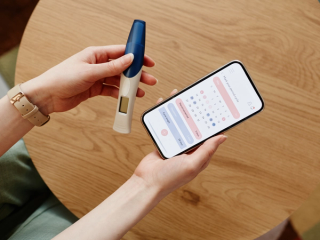
- Home
- Advice Hub
- Conception
- Fertility & Infertility
- Fertility Tests: What You Need To Know
Types of Fertility Tests: What you need to know
Learn the essentials of fertility tests, including types, how they work, and options for both men and women to assess reproductive health.
Thinking about starting a family or simply curious about your reproductive health? Fertility tests can provide valuable insights into your fertility health, whether you’re planning for the near future or just want to understand your body better.
From evaluating hormone levels to checking sperm health, these tests help identify potential issues and give you a clearer picture of your fertility. In this guide, we’ll explore the different types of fertility tests available for both men and women, how they work, and what steps to take depending on your results.
What is a fertility test?
A fertility test is a medical or at-home assessment that helps determine your ability to conceive. These tests look at factors like hormone levels, uterine and ovary health, sperm quality, and ovulation patterns.
We believe it’s never too early to consider fertility tests, as understanding your fertility can empower you to make informed decisions about your fertility, either now or for the future.
Types of fertility tests for women
Ovulation tests
Using ovulation tests is often the first test you might consider. Ovulation predictor kits (OPKs) detect the luteinizing hormone (LH) surge that triggers ovulation, helping to identify the most fertile days.
However, it is important to be aware that not OPK’s may not work for all women, particularly if you have or think you may have polycystic ovarian syndrome (PCOS).
Fertility Blood Tests
Blood tests can check hormone levels such as FSH (Follicle Stimulating Hormone), LH, estradiol, prolactin, and AMH (Anti-Müllerian Hormone), which gives insights into ovarian reserve.
You may also like to understand if your vitamin D levels are normal and consider other tests such as testosterone and Sex Hormone Binding Globulin (SHBG), if you are concerned that you may have PCOS.
Your doctor can arrange these simple blood tests for you, or you might like to consider At-Home testing. Some home testing providers also provide fertility consultations to give you feedback on your results and what this means for you, along with advice on next steps.
Ultrasound Scans
Transvaginal ultrasounds help examine the uterus and ovaries, identifying structural issues that could impact fertility, as well as assessing the ovaries to look for cysts. Your GP may be able to arrange a scan for you or you will be offered this once referred to the fertility doctors.
Hysterosalpingography (HSG)
This special X-ray checks if the fallopian tubes are open and if the uterus has any abnormalities. This is usually offered to you, by your fertility doctor if you have not been able to conceive naturally after trying for 12 months, if you are under the age of 35 or 6 months if over 35. This test is especially important if you have had a sexually transmitted infection, such as chlamydia, in the past.
You can read more about trying to conceive here.
Types of fertility tests for men
Men account for about half of fertility issues, and, as it takes two to make a baby, male fertility testing is crucial in the fertility journey.
Sperm fertility test (semen analysis)
This is the most common male fertility test, assessing sperm count, motility and morphology – the shape and structure of the sperm. This can be arranged by your GP.
You can consider home testing of two of the three sperm parameters – count and motility. It is worth being aware that it is not possible to check morphology via a home test and therefore, whilst a home test provides an insight, you won’t have a full picture.
Hormone Blood Tests
Although not routinely offered, if your doctor feels, based on current or past medical history, that it is necessary to check male hormones, a thorough assessment of hormones such as testosterone and other necessary biomarkers will be done.
Scrotal examination and ultrasound
If appropriate, a male partner may be offered an examination of their testicular health to look for blockages or varicoceles.
What should you do if your test results are irregular?
It is totally normal for you to feel anxious about having fertility tests done. If you then receive an abnormal result, it can feel very overwhelming, and you may be wondering who you can talk to and what options are available to you.
The first step is to chat with your GP. Your doctor will be able to advise you on the next steps and if necessary, refer you to a fertility specialist. Fertility specialist can then guide you through advanced testing or treatments.
With your fertility specialist, you can explore your treatment options, this may include fertility medications, IUI, or IVF.
It’s also vitally important to start considering some lifestyle adjustments to optimise your fertility. Improving your diet, reducing stress, quitting smoking, reducing alcohol and caffeine can all support fertility.
Read this guide more insights on diagnosing and treating fertility problems guide.
Can fertility be tested while using contraception?
The answer to this question is yes and no! It depends on what type of contraception you are using. If you are using a non-hormonal method such as condoms, diaphragm or the copper coil (IUD), then yes – you can check your fertility through blood testing at any time. However, if you are using hormonal contraception such as the pill, injection, implant or hormone coil, then you would need to stop your contraceptive method before having a fertility testing.
Fertility test FAQs
You can test your fertility by blood tests, ultrasounds, or semen analysis arranged by your doctor. Or you can consider At-home fertility test kits for blood tests or sperm analysis (remember an At-Home sperm test does not include all the important parameters to make a full assessment of sperm health.
Your GP might start with:
- Fertility blood tests
- Semen analysis
- Ultrasound scans
If necessary, your GP may then refer you to a specialist for more advanced tests.
Yes, you can get access to all fertility test on the NHS, including initial blood work, semen analysis, and scans. However, waiting lists can be long and some people make the decision to access these tests privately if they are financially able.
Summary
Fertility testing is an empowering step for anyone considering their reproductive health. Whether you're exploring fertility tests for women, male fertility tests, or looking into At-home fertility test options, understanding your fertility is the first step in your journey. Always consult your doctor for personalised guidance and advice on next steps.












